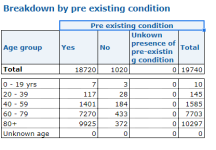Thing is, I've seen 1% banded about as proof that it isn't so bad, well that 35 a day is 1% of their residents, every 3 days, that's shocking. And I take your point about the other residents not being able to go to hospital but that's kind of the point isn't it, people claim the hospitals are coping - They are, by not doing other stuff, people are dying as a direct result - As per our previous conversation on anecdotes, my sister in law is a senior blood cancer consultant, they are having to make decisions about treating the 80 year old Covid patient or the 18 year old suffering Leukemia, to hear her talk about that the situation is heartbreaking.
But again that’s completely without any context.
What’s the normal rate?
According to the google 103,000 people died in care homes in 2014 (can’t find anything else) that’s 29 people a day.
It’s not right, but that’s the same in normal times - we hear horror stories from inside the NHS (not frontline staffs fault) all the time.

